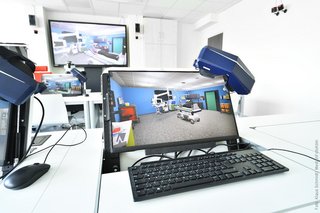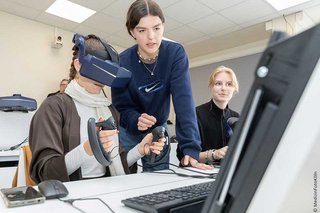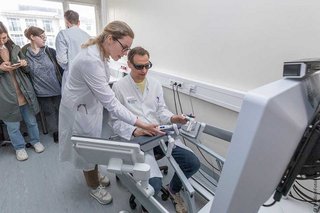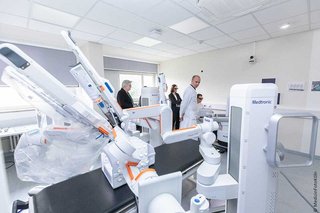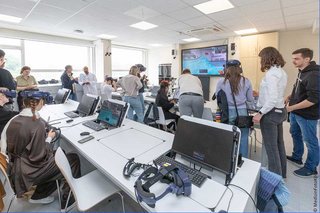With the CeMIT Cologne, the Faculty of Medicine and University Hospital Cologne will be given a new facility that promotes research and teaching with robotics and extended reality on campus
Since 24 May 2024, the new centre has been available for students and researchers in human medicine at the Medical Campus of the University of Cologne. The CeMIT Cologne teaching and research laboratory (Center for Medical Innovation and Technology) is based on the pillars of extended reality and robotics: For this purpose, thirteen virtual reality places as well as a robotics room with the surgical robot Hugo by Medtronic were set up in two rooms of the Anatomy Centre.
In the robot room and at the VR workplaces, both students and assistant physicians can train how to carry out operations and emergency scenarios through VR simulations, as well as complete practical exercises with robot systems. In addition, numerous studies are already being conducted on issues relating to extended reality and robotics.
The CeMIT Cologne is part of the Clinic for General, Visceral, Cancer and Transplantation Surgery under the direction of Professor Dr Christiane J. Bruns. It was founded by Professor Dr Hans Fuchs, Professor of robotic-assisted minimally invasive surgery and artificial intelligence in surgery, and PD Dr Rabi Raj Datta, senior physician and education coordinator of the clinic. As part of the clinic, the new centre will function as a bridge between medical research, industry and clinical applications due to its technical equipment. This allows innovative technologies to be tested directly in practice and teaching.
CeMIT aims at creating enthusiasm for the surgical disciplines through the ‘surgical track’ using the latest technologies early on in the course of medical studies. In addition, CeMIT will substantially expand research and teaching at the Faculty of Medicine with the new techniques and set new standards. In collaboration with the departments of anatomy, gynaecology, midwifery science, anaesthesiology, emergency medicine and the nursing school, VR programmes have already been developed to better visualize anatomical spaces, birth development or various emergency scenarios in the shock room and in the normal ward. The programmes and opportunities will be expanded in the future through cooperation with the Neurosciences degree programme and other subjects.
The costs for the CeMIT Cologne were covered by funds from the Faculty of Medicine, the Cologne University Foundation and the Higher Education Pact III by the federal government and the Länder. The costs for the surgical robot Hugo are covered by the manufacturer Medtronic.
Media Contact:
PD Dr. Rabi Raj Datta
Klinik und Poliklinik für Allgemein-, Viszeral-, Tumor- und Transplantationschirurgie, Lehrkoordinator der Klinik
+49 221 478 6378
rabi.dattauk-koeln.de
Press and Communications Team:
Eva Schissler
+49 221 470 4030
e.schisslerverw.uni-koeln.de
